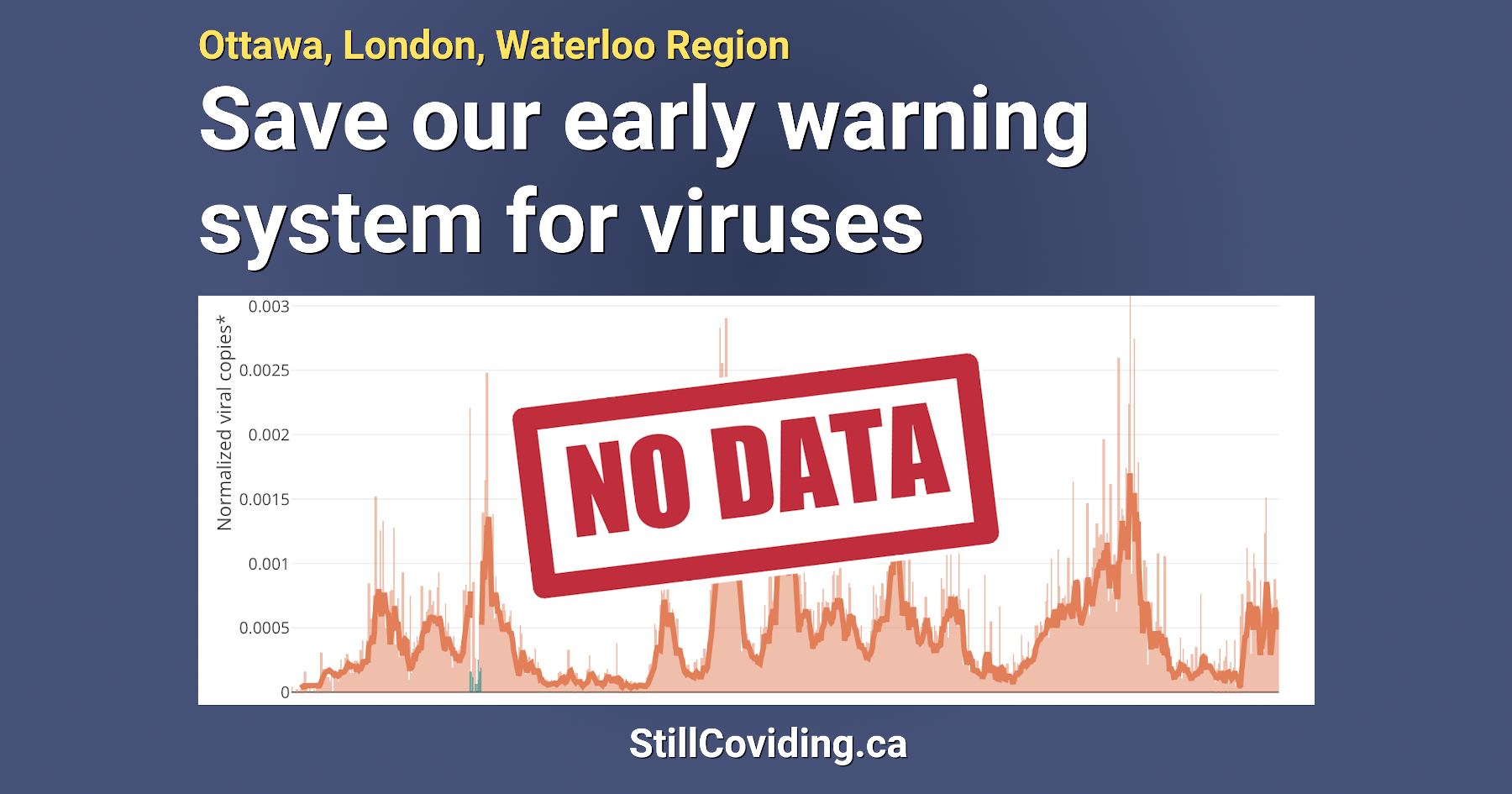📣 Let municipal councillors know you want funding for wastewater monitoring to continue
✉️ Send letters to municipal councillors to voice your support for wastewater monitoring. Use our online tool to send emails.
Contact councillors in Ottawa
Contact councillors in London
Contact councillors in Waterloo Region
Why take action? Wastewater monitoring is an essential public health tool that provides insights into the spread of SARS-CoV-2 and other viruses in Ontario’s communities. We need an early warning system to inform everyone about the prevalence of SARS-CoV-2 subvariants, influenza, avian flu, RSV, mpox, and other viruses.
Effective July 31, the Ontario government has shut down the province’s extensive wastewater monitoring network. The network’s 58+ stations provided coverage for 34 public health units. Wastewater monitoring continues in Ottawa and London, with temporary funding. The cities should follow the example of Peterborough — it is providing funding for the near real-time monitoring that our communities need.
Meanwhile, the Public Health Agency of Canada (PHAC) has four stations in one city (Toronto). The federal government did not take over Ontario’s program. It is also important to note that PHAC does not provide daily wastewater data. There are significant lags in the reporting of the data (as long as a month!). People with disabilities, the immunocompromised, and other equity-denied groups rely on daily wastewater data to time risky activities such as medical appointments.
Please take a moment to voice your support for wastewater monitoring in Ontario!
- Make sure your email application is active (e.g. Mail or Thunderbird).
- Click a button in a contact list below. It will create a message using the message template.
- Customize your message. Don’t forget to add your name and email address, and modify the wording of the message if you like.
- Click the send button in your email software.
- Repeat — click the button for the next person in the list. It’s easy to go through the list.
Note: For best results, use an iPhone or another smartphone. If a message isn’t created when you click or tap a button, you can try using a different device. This won’t work with Internet Explorer; use Firefox, Safari or Chrome instead. Issues with Microsoft Outlook have been reported.
📣 More ways to take action
✉️ Use our online tool to send letters to MPPs. Sign the petitions and call MPPs.
Contact councillors in Ottawa
To:
List of contacts — Ottawa
Cc:
- Vera Etches, Ottawa Public Health, Vera.Etches@ottawa.ca
- Councillor Catherine Kitts, Chair, Board of Health, Catherine.Kitts@ottawa.ca
- Joel Harden, MPP Ottawa Centre, jharden-co@ndp.on.ca
Subject: Save Ottawa’s daily wastewater surveillance!
Message template:
Contact councillors in London
To:
List of contacts — London
Cc:
- Mayor Josh Morgan, mayor@london.ca
- Dr. Alexander Summers, Medical Officer of Health, Alexander.Summers@mlhu.on.ca
- Dr. Joanne Kearon, Associate Medical Officer of Health, Joanne.Kearon@mlhu.on.ca
- Peggy Sattler, MPP London West, PSattler-QP@ndp.on.ca
Subject: Save London’s wastewater monitoring!
Message template:
Contact councillors in Waterloo Region
To:
List of contacts — Waterloo Region
Cc:
- Catherine Fife, MPP Waterloo, cfife-qp@ndp.on.ca
- Aislinn Clancy, MPP Kitchener Centre, aclancy-qp@ola.org
- Mike Morrice, MP Kitchener Centre, mike.morrice@parl.gc.ca
- Jess Dixon, MPP Kitchener South-Hespeler, jess.dixon@pc.ola.org
- Brian Riddell, MPP Cambridge, Brian.Riddell@pc.ola.org
- Valerie Bradford, MP Kitchener South-Hespeler, valerie.bradford@parl.gc.ca
- Brian May, MP Cambridge, bryan.may@parl.gc.ca
- Bardish Chagger, MP Waterloo, bardish.chagger@parl.gc.ca

